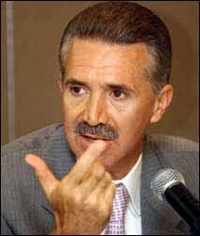 |
 |
 |
 News Around the Republic of Mexico | July 2005 News Around the Republic of Mexico | July 2005  
Journalists Waver On Naming Favorite
 Jonathan Clark - The Herald Mexico Jonathan Clark - The Herald Mexico


| | PRI probable candidate Roberto Madrazo "looks like a gangster" to many Mexicans. |
A panel of foreign business and economics correspondents on Thursday hesitated to name a favorite in the 2006 presidential elections, but suggested that the race was shaping up as a showdown between the Institutional Revolutionary Party's (PRI) political machine and the personal dynamism of Mexico City Mayor Andrés Manuel López Obrador.

Speaking at an American Chamber of Commerce-sponsored forum titled "Lo bueno, lo malo y lo polémico del proceso electoral presidencial 2006," which the panelists translated as "The good, the bad and the ugly" of the 2006 presidential race, reporters for The Economist, The Wall Street Journal and Business Week also discussed the potential significance of absentee voting and the possibility of postelection instability.

While the panelists pointed to the Institutional Revolutionary Party's convincing gubernatorial victory as well as its massive campaign spending and vote buying last month in the State of Mexico as a sign that the party's political machine remains alive and well, none of the three journalists were willing to call a PRI victory "likely" in 2006.

The problem for the PRI, said David Luhnow of The Wall Street Journal, is that their most probable candidate, current party president Roberto Madrazo, is not a likeable figure.

"He looks like a gangster" to many Mexicans, said Luhnow, which could be a major issue in a nation where candidate's personalities are often as important as their platform.

López Obrador, the shoo-in for the nomination of the Party of the Democratic Revolution, or PRD, connects better with voters thanks to an agenda that speaks directly to their needs, said Business Week's Geri Smith.

"Sure it's populism," she said of the mayor's 50-point campaign platform that promises, among other things: more jobs, public works projects and pensions for the elderly. "But he at least has shown (people) that he is aware of Mexico's problems."

Asked if the potential election of leftist López Obrador should be a cause of concern or fear, especially among the business community, Konstantin Kakaes of The Economist responded negatively.

"There is reason for uncertainty" with López Obrador, he said, "but not definite pessimism."

"Don't pre-judge López Obrador," Kakaes advised the audience, pointing to Carlos Salinas and Ernesto Zedillo as examples of Mexican presidents who turned out much differently than what their candidacies had suggested. "If business is skittish about him from the start, it could turn out to be a self-fulfilling prophecy."

The need for wide-scale reform was a recurring theme during the discussion, and the panelists were asked to handicap the current frontrunners as potential reformers.

López Obrador could be expected to take on tax reform, said Luhnow, especially the current income tax code that sees the wealthy pay little or nothing in taxes. And Smith and Kakaes added infrastructure and education as two areas that the former mayor could tackle successfully. But Lunhow was skeptical that López Obrador would be a major proponent of legal reform. "Rule of law is not top-of-mind with him," he said.

Kakaes said that Madrazo, the most experienced politician in the pack, would have the greatest ability to get reform bills through a divided Congress, but that he would probably lack the will to do so. And Smith spoke of the need to reduce the size of the Congress and institute congressional re-election; a shake-up that might be best accomplished by legal-minded Santiago Creel, current favorite to win the nomination of the National Action Party, or PAN.

None of the panelists, however, gave Creel a strong chance of winning the presidency.

In terms of absentee voting, a first-time feature of presidential elections in 2006, Smith predicted a small number of overseas ballots with a negligible effect on the outcome. Luhnow, however, pointed to the challenges that electoral officials will have in collecting and processing the absentee ballots, and wondered if they might present a significant problem in what could be a very tight, three-way vote.

The possibility of a close voting result concerned Smith, who pointed out that Mexico has no legal provision for a runoff election. And Luhnow said that there was potential for post-election problems in the case of a tight vote.

"If it's the PRI or López Obrador who comes in second" in a contested decision, he said, "there could be instability."

The PAN, on the other hand, "has shown that it is willing to put its tail between its legs" when it loses, he said. | 
 | |
 |



